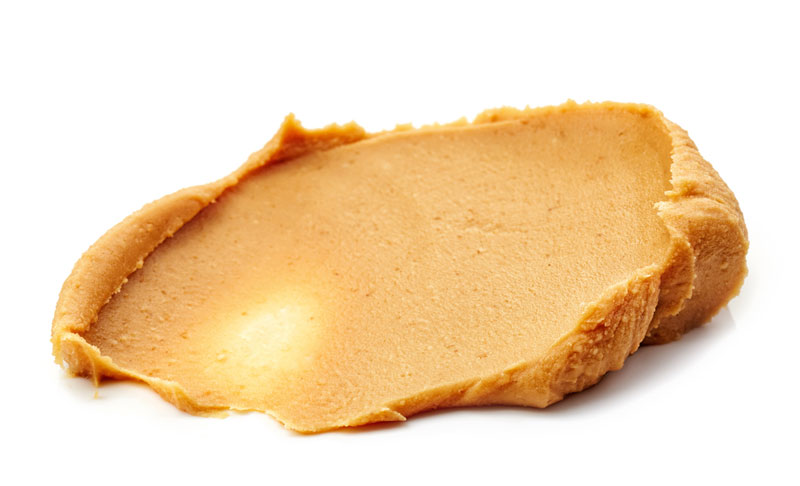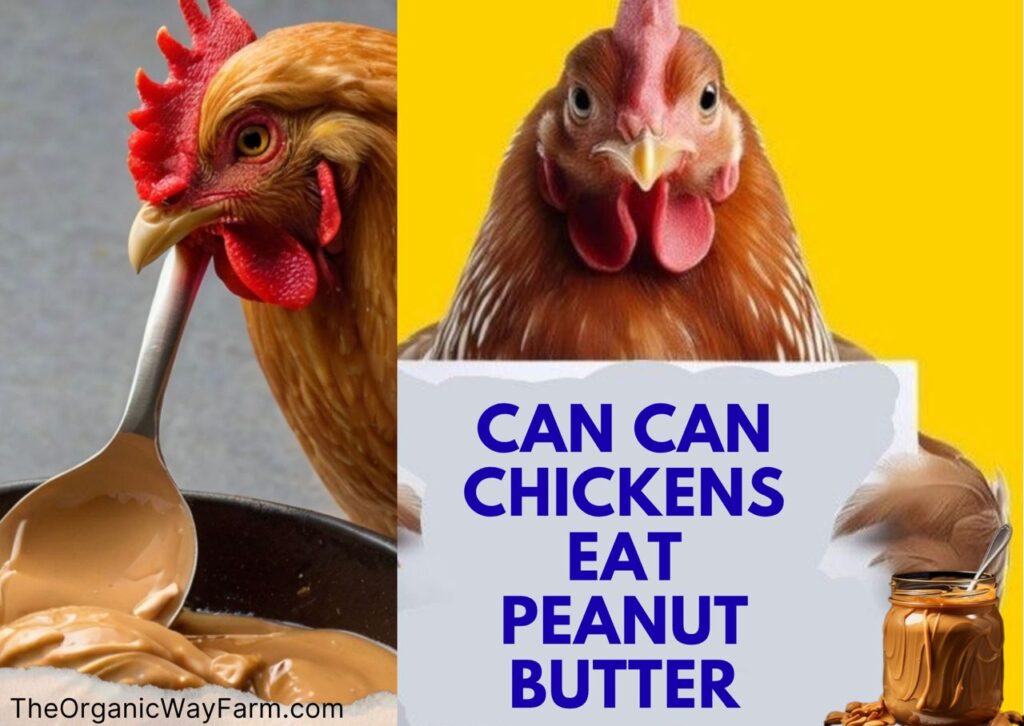If you have a few chickens roaming around your yard and you want to treat them with something special, you might be asking, “Can chickens eat peanut butter?” You are certainly not alone in wondering this! Many chicken owners are curious about what human foods they can share with their feathery friends.
The simple answer is YES, chickens can eat peanut butter in moderation. However, it is important to know that peanut butter should not be fed to them all the time or in excessive amounts. Why? Peanut butter is rich in fats and protein, which can be beneficial but can also lead to weight gain if consumed too frequently.
Keep reading as we explore not just the answer to whether chickens can eat peanut butter, but also how much is safe, the best ways to feed it, the benefits and risks, and some fun substitutes to consider.
- Can Chickens Eat Peanut Butter?
- How Much Peanut ButterCan Chickens Eat?
- Best Way to Feed Peanut Butterto Chickens
- Benefits of Feeding Peanut Butterto Chickens
- Risks of Feeding Peanut Butter to Chickens
- Substitutes for Peanut Butter in Chicken Diet
Let’s get started!
Can Chickens Eat Peanut Butter?

Peanut butter is a popular spread made from ground, roasted peanuts. It is creamy and delicious, making it a favorite for many people. But can we extend this tasty treat to our chickens? The answer remains positive—yes, chickens can eat peanut butter. Chickens are omnivores, which means they can eat both plant and animal-based foods. This flexibility in their diet allows them to enjoy a variety of foods, including peanut butter.
However, moderation is key. Peanut butter is high in fat. This is not necessarily bad. Chickens need some fat in their diet, but too much can lead to obesity. An overweight chicken can have trouble laying eggs and may be more susceptible to health problems. So, while our chickens can certainly enjoy peanut butter, it should be a rare treat rather than a basic food source.
Another aspect we should consider is the ingredients of peanut butter. Pure peanut butter with no added sugar or salt is the best option for feeding our chickens. Many store-bought peanut butter brands contain added ingredients that might not be healthy for our feathered friends. Therefore, ensure we check the label carefully before offering it to our chickens.
It’s also worth noting that peanut butter is somewhat sticky. This can be an issue for chickens if we feed them too much at once. The sticky nature might cause it to clump up in their throat, leading to choking. To avoid this, we want to provide peanut butter in a very small amount, or we can mix it with other foods to help it go down easier. So we see that while chickens can have peanut butter, caution is essential.
How Much Peanut Butter Can Chickens Eat?
The quantity of peanut butter that we can safely offer our chickens is crucial to their well-being. While they can eat it, our approach should be responsible. A small spoonful of peanut butter is generally enough as a treat. We want to avoid giving them an entire jar, as that could lead to health issues.
Understanding the ratio is important. We can think of peanut butter as a topping for chicken treats rather than the main dish. Chickens should primarily eat a balanced diet of high-quality chicken feed, fresh vegetables, and grains. Treats like peanut butter should only make up a small part of their overall diet. A simple rule to follow is that treats, including peanut butter, should not exceed 10% of their daily intake.
To clarify, if we have one chicken consuming roughly half a cup of feed daily, we would only want to offer about a tablespoon of peanut butter at most. This method ensures our chickens get the nutrients they need without overwhelming them with fat.
Another fact to keep in mind: Chickens don’t process certain foods the same way we do, so we always want to introduce any new food gradually. It can be helpful to mix peanut butter with their regular feed or spread it on a slice of whole-grain bread to make it easier for them to consume without the risk of choking.
In essence, moderation is the golden rule. When it comes to peanut butter, a little goes a long way with our chickens.
Regular monitoring of our chickens’ health and behavior after they eat new foods like peanut butter can help gauge how well they adapt to treats. If they seem to enjoy the taste but have any issues after consuming it, we may want to reconsider its place in their diet. Consistency while providing safe and fun treats can keep our chickens happy and healthy.
Best Way to Feed Peanut Butter to Chickens
Feeding peanut butter to chickens can be fun and creative! To ensure our chickens enjoy their treat, we want to think about the best way to serve it. Here are several methods we can try:
1. Mixing with Other Foods: Combining peanut butter with other foods can make it easier for our chickens to eat and more appealing. Spreading a thin layer of peanut butter on grains can add flavor and stimulate their taste buds. Whole grain bread is another great base for peanut butter. We can simply spread a tiny amount between two slices of bread to create a peanut butter sandwich for our chickens.
2. Using as a Treat in a Pecking Box: Pecking boxes are a popular way to feed treats to chickens. We can place different snacks and foods inside a box with holes for chickens to poke their heads through. Adding small spoonfuls of peanut butter into the pecking box can keep them engaged as they search for their treat among the other goodies.
3. Frozen Treats: Chickens can enjoy cold treats, especially on hot days. We can freeze peanut butter mixed with fruits like blueberries or strawberries in ice cube trays. Once frozen, we can pop them out and provide our chickens with a refreshing and fun treat.
4. Spread on Vegetables: A creative approach is to spread peanut butter on vegetables that are safe for chickens, such as celery or carrots. This adds nutrition while delivering a delicious taste that chickens will love.
5. Watch for Potential Choking Hazards: As mentioned earlier, peanut butter can be somewhat sticky. We want to keep an eye on our chickens while they eat to make sure they aren’t struggling to swallow it. If we notice any problems, it might be a good idea to discontinue its use altogether.
Overall, experimenting with different feeding methods can be an enjoyable way for us to find what our feathered friends like best. It also allows us to mix it up so their treat time is never dull!
Benefits of Feeding Peanut Butter to Chickens
Hydration
When feeding our chickens peanut butter, we can also think about how it fits into their overall diet and health. Interestingly, peanut butter can play a role in helping our chickens stay hydrated. High-fat foods like peanut butter can help our chickens retain moisture within their bodies. Although peanut butter is not a wet food, it can serve as an additional source of energy for chickens, especially during colder months when they may need extra energy to maintain body heat. That being said, we still encourage offering plenty of clean, fresh water to our chickens every day, as hydration is key to their health.
Fiber
Fiber is essential for our chickens, and peanut butter does contribute minimally to their fiber intake. Having a well-rounded diet helps chickens keep their digestive systems running smoothly. When we combine peanut butter with other high-fiber foods, this can create a tasty mix that provides additional benefits beyond just the flavor. Certain vegetables, grains, and fruits with high fiber can make for excellent accompaniments to peanut butter, enhancing both the nutritional value and the treat experience.
By staying mindful of creating a balanced diet, we will ensure our chickens are feeling their best!
Vitamins and Minerals
Peanut butter contains some vitamins and minerals that can benefit our chickens in small amounts. For example, vitamins E and B, along with magnesium, are present in peanut butter. These nutrients play vital roles in overall health. Vitamin E is essential for boosting their immune system and promoting healthy feather development. While peanut butter should not be a primary source of these nutrients, incorporating it can supplement the vitamins in their diet, especially when shared occasionally with other healthy snacks.
Mental Stimulation
Chickens thrive on interaction and mental challenges. Offering new treats like peanut butter can stimulate their minds and encourage pecking and foraging behaviors. Keeping our chickens engaged is important for their emotional well-being, and providing diverse treats allows them to participate in natural behaviors. When chickens have the opportunity to experiment with different textures and flavors, it can lead to happier, more active birds.
Nutritional Breakdown of Peanut Butter
To better understand the advantages peanut butter can provide, let’s take a brief look at its nutritional breakdown. Peanut butter is primarily composed of proteins, fats, carbohydrates, vitamins, and minerals. While the fat content is relatively high, it serves to provide energy for our chickens. The protein content is also beneficial as it contributes to tissue growth and repair.
This balance allows peanut butter to be a moderate choice when incorporated thoughtfully into their diets. Remember, the key is to keep offering a variety of choices to ensure our chickens receive all they need.
Dangers of Feeding Peanut Butter to Chickens
As we explore the world of feeding peanut butter to our chickens, it’s worth discussing some risks and dangers associated with it. We always want to consider our chickens’ health before introducing any new foods into their diet.
One significant concern is the fat content. While chickens need fats in their diet for energy, excessive fat can lead to weight gain and obesity. Obesity is not just an aesthetic concern; it can impact the general health and egg production of our chickens. It’s essential to be mindful of portion sizes to keep our chickens fit and healthy.
Another noteworthy issue is the sticky consistency of peanut butter. If chickens consume too much at once, it can clump in their throat, leading to a choking hazard. Chickens do not chew their food the same way humans do; they simply swallow it. Therefore, serving a small amount while keeping an eye on them while they eat can significantly reduce this risk.
We also want to be cautious about potential allergic reactions. While rare, some chickens may have an intolerance or allergy to peanuts. The symptoms could include digestive upset, which might manifest as unusual droppings or changes to their eating habits. If we notice any sign of distress, we should discontinue offering them peanut butter right away and consult a veterinarian if the symptoms persist.
Lastly, keep in mind that not all peanut butter brands are created equal. Many contain added sugars, oils, or preservatives, which may be harmful to chickens. Always choose pure peanut butter without any additives, ensuring that the treats we offer remain healthy and safe.
Considering these risks allows us to keep our chickens healthy and happy, ensuring that everything we provide contributes positively to their lives.
Substitutes for Peanut Butter in Chicken Diet
If peanut butter isn’t our chicken’s cup of tea, or if we prefer to offer alternatives, several substitutes can serve as fun and healthy treats for our chickens.
1. Nut Butters: Almond butter or cashew butter can be great alternatives. These nut butters often contain similar nutritional values and can provide variety without introducing risks associated with peanut butter.
2. Yogurt: Plain, unsweetened yogurt is a delicious treat that chickens can enjoy. Yogurt aids digestion thanks to its probiotics and is a great source of calcium for egg production.
3. Fruit and Vegetable Mash: A blend of fruit and vegetables can offer texture and nutrients without the fat content found in nut butters. Chickens usually adore strawberries, blueberries, and carrots, making these a great modification to their usual fare.
4. Cottage Cheese: This offers protein without excess fat. Chickens typically love the taste and texture, making it easy to introduce into their diets.
5. Sunflower Seeds: High in healthy fats and proteins, sunflower seeds can keep chickens happy. They can be offered as a treat on their own or mixed into their feed.
By considering these substitutes, we can provide a range of tastier options that still contribute to their health and well-being. Taste-testing these alternatives can be an enjoyable experience for both us and our chickens, discovering their favorites along the way!
Frequently Asked Questions
Is peanut butter safe for chickens?
Yes, peanut butter is safe for chickens to eat, but it should be given in moderation to avoid potential health issues related to high-fat content.
Can chickens get addicted to peanut butter?
While chickens may enjoy peanut butter, it is essential to maintain a balanced diet. They should not rely on it as a primary food, and it is unlikely that they would become dependent on it.
Can peanut butter be mixed with chicken feed?
Yes! Mixing a small amount of peanut butter with chickens’ feed can enhance their diet and makes meal time more exciting.
How often can I feed my chickens peanut butter?
Peanut butter should only be offered occasionally, ideally once a week, to keep it as a special treat.
What are the best alternatives to peanut butter for chickens?
Good alternatives include yogurt, cottage cheese, fruit and vegetable mash, nut butters, and sunflower seeds.
Final Thoughts
Feeding chickens can be a delightful experience when we know what treats are safe and beneficial. Peanut butter can certainly be included in their diet as an occasional treat, provided we keep portions small and monitor their health. Considering their reactions to new foods will ensure our feathered friends remain safe, healthy, and happy.
As we continue our journey in finding the best for our chickens, remember to explore various foods and keep things exciting for them. For example, you can find out if chickens can eat grapes by following this link. Enjoy discovering new treats together and savoring the joy our chickens bring to our lives!






